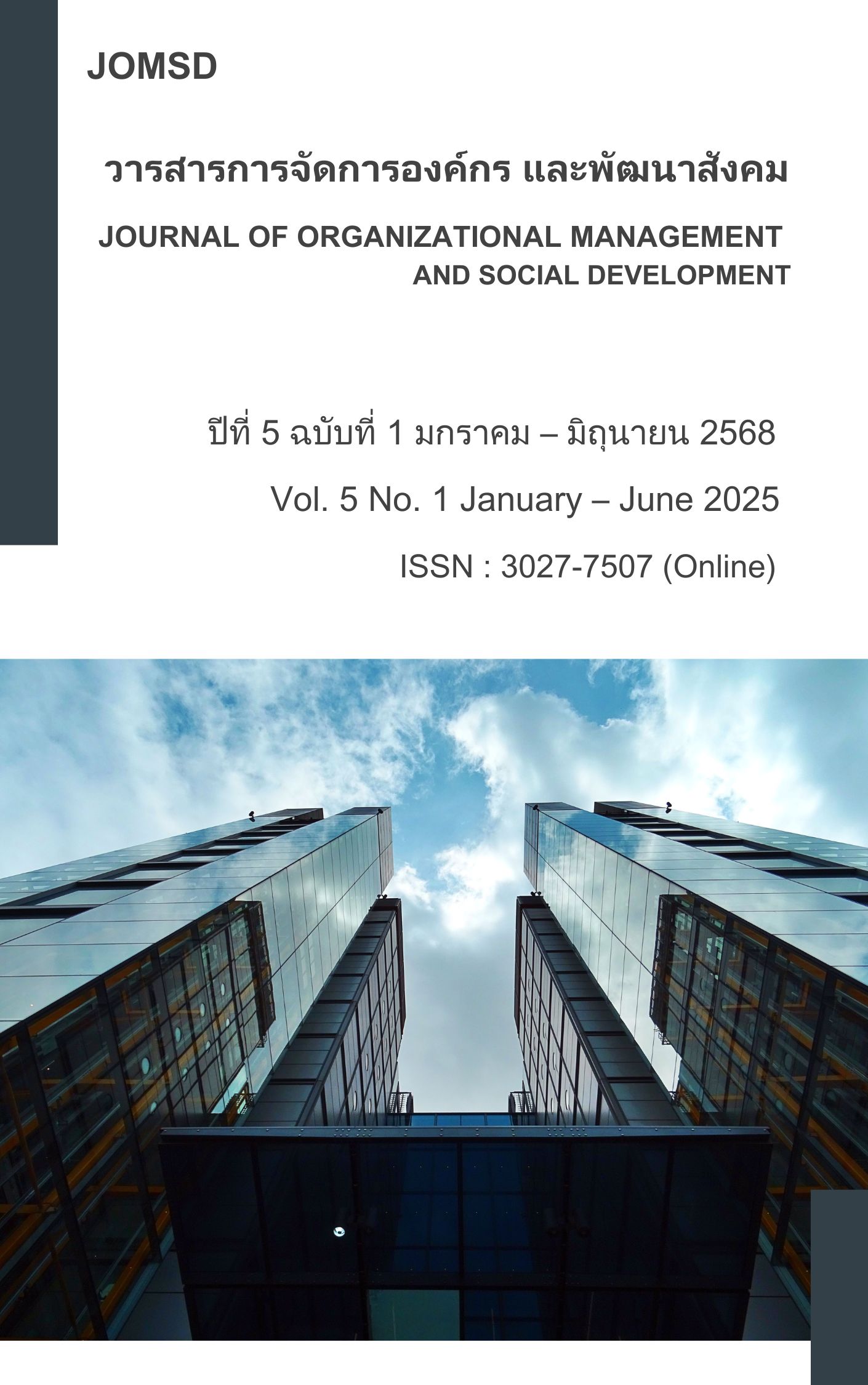The Development of a Green Tourism Model in Satun UNESCO Global Geopark
Main Article Content
Abstract
This research aims to 1) analyze the qualitative potential of tourist attractions in the Satun UNESCO Global Geopark; 2) study tourist behaviors and satisfaction regarding green tourism in the area; 3) assess tourists’ willingness to pay (WTP) for green tourism activities; and 4) propose a model for green tourism development that promotes sustainability and community participation in alignment with the Sustainable Development Goals (SDGs). A mixed-methods approach was employed, combining quantitative data collection through questionnaires and qualitative data from in-depth interviews and focus group discussions. The study involved 400 participants from three target groups: 200 tourists, 120 local tourism operators and relevant agencies, and 80 experts in green tourism management. The findings reveal that 1) Satun UNESCO Global Geopark possesses high potential for developing green tourism consistent with UNESCO guidelines and the SDGs, with an emphasis on community participation, environmental conservation, and local economic development in an integrated manner. 2) The multiple regression analysis showed that the model explained 62.4% of the variance in the dependent variable (R² = 0.624), which is considered a high predictive power based on Cohen's (1988) criteria. 3) The study suggests implementing a Green Fee of 150–200 baht per activity, based on tourists’ average WTP for green tourism activities in the Geopark. 4) The proposed green tourism model emphasizes a combination of nature-based conservation activities and local economic development through eco-tour packages offering immersive experiences, such as geological learning trips, community-based activities, and ecological education.
Article Details
References
กรมการท่องเที่ยว. (2564). รายงานสถานการณ์การท่องเที่ยวและแนวโน้มการพัฒนา. กรุงเทพฯ: กระทรวงการท่องเที่ยวและกีฬา.
กรมทรัพยากรธรณี. (2562). ข้อมูลอุทยานธรณีโลกสตูล. กรุงเทพฯ: กระทรวงทรัพยากรธรรมชาติและสิ่งแวดล้อม.
กรมทรัพยากรธรณี. (2565). รายงานการประเมินศักยภาพทางธรณีของอุทยานธรณีโลกสตูล. กรุงเทพฯ: กระทรวงทรัพยากรธรรมชาติและสิ่งแวดล้อม.
ปิยาภรณ์ รัตโนภาส, จาตุรันต์ แช่มสุ่น, อารยา สุนทรวิภาต, ลักษมณ บุญมา และปวงปณต สอบขุนทด.(2567). การเพิ่มศักยภาพการท่องเที่ยวชุมชนด้วยผลิตภัณฑ์และเชื่อมโยงเส้นทางการเที่ยวตามแนวชายฝั่งทะเล จังหวัดจันทบุรี. วารสารสังคมศาสตร์ปัญญาพัฒน์, 6(1), 309-324.
ภรณ์พักตรา ศักดา, ยกสมน เจ๊ะเฮง, เกสสิณี ตรีพงศ์พันธุ์ และจารีย์ พรหมณะ. (2567). การจัดกิจกรรมการท่องเที่ยวอย่างยั่งยืนโดยการมีส่วนร่วมของชุมชน ตำบลตะกรบ อำเภอไชยา จังหวัดสุราษฎร์ธานี. วารสารสังคมศาสตร์ปัญญาพัฒน์, 6(4), 153-166.
ระชานนท์ ทวีผล, ฉัตรวริน คลองน้อย, พรหมมาตร จินดาโชติ, สไบทิพย์ มงคลนิมิตร์ และรัชมงคล ทองหล่อ. (2568). รูปแบบการส่งเสริมความเป็นอยู่ที่ดีอย่างยั่งยืนในอุตสาหกรรมท่องเที่ยวไทย. Journal of Spatial Development and Policy, 3(2), 29-44.
สถาบันวิจัยวิทยาศาสตร์ทางทะเล. (2563). รายงานการศึกษาผลกระทบด้านสิ่งแวดล้อมจากการท่องเที่ยวในจังหวัดสตูล. ชลบุรี: มหาวิทยาลัยบูรพา.
สำนักบริหารพื้นที่อนุรักษ์ที่ 6. (2564). แผนบริหารจัดการทรัพยากรธรรมชาติอุทยานธรณีโลกสตูล. สงขลา: กรมอุทยานแห่งชาติ สัตว์ป่า และพันธุ์พืช.
อัจฉรา ประยูรคง, กัมปนาท วิจิตรศรีกมล, รุ่งเรือง พูลศิริ และนภสม สินเพิ่มสุขสกุล. (2567). ศักยภาพของอุทยานแห่งชาติเจ็ดคด-โป่งก้อนเส้า ในการพัฒนาเพื่อเป็นแหล่งท่องเที่ยวเชิงนิเวศที่สำคัญของประเทศ. วารสารสังคมศาสตร์ปัญญาพัฒน์, 6(4), 1-12.
อารยา สุนทรวิภาต, ลักษมณ บุญมา, ธัชนันท์ สังวาล, พัชรี ปรีเปรมโมทย์ และกนกรัชต์ กาสาวพานิชย์. (2565). ความพึงพอใจของนักท่องเที่ยว และแนวทางการยกระดับการพัฒนาแหล่งท่องเที่ยวอย่างยั่งยืน: เกาะหมาก จังหวัดตราด. วารสารสังคมศาสตร์ปัญญาพัฒน์, 4(4), 297-312.
Ajzen, I. (1991). The theory of planned behavior. Organizational Behavior and Human Decision Processes, 50(2), 179–211.
Chambers, R. (1997). Whose Reality Counts?: Putting the First Last. London: Intermediate Technology Publications.
Cohen, J. (1988). Statistical Power Analysis for the Behavioral Sciences. (2nd ed.). New Jersey: Lawrence Erlbaum.
GeoPoll. (2025). Sampling best practices for mobile surveys. Retrieved from https://www-geopoll-com.translate.goog/blog/sample-size-research/?_x_tr_sl=en&_x_tr_tl=th&_x_tr_hl=th&_x_tr_pto=tc.
Hanley, N., Wright, R. E., & Adamowicz, V. (2003). Valuing the environment in developing countries: An overview. Environmental and Resource Economics, 22, 1–6.
Jamal, T., & Getz, D. (1995). Collaboration theory and community tourism planning. Annals of Tourism Research, 22(1), 186–204.
Stern, P. C., Dietz, T., Abel, T., Guagnano, G. A., & Kalof, L. (1999). A value-belief-norm theory of support for social movements: The case of environmentalism. Human Ecology Review, 6(2), 81–97.
The International Ecotourism Society (TIES). (2015). What is ecotourism?. Retrieved from https://ecotourism.org/news/what-is-ecotourism/.
UNESCO. (2021). UNESCO Global Geoparks: Celebrating Earth heritage, sustaining local communities. Retrieved from https://en.unesco.org/global-geoparks.
United Nations Educational, Scientific and Cultural Organization. (2019). Satun UNESCO Global Geopark: Thailand’s First Global Geopark. Retrieved from https://en.unesco.org.
United Nations Educational, Scientific and Cultural Organization. (2020). UNESCO Global Geoparks: Promoting Geodiversity and Local Sustainability. Retrieved from https://en.unesco.org.
United Nations Environment Programme. (2021). Sustainable Coastal Tourism: Challenges and Recommendations. Retrieved from https://www.unep.org.
United Nations. (2015). Transforming our world: The 2030 Agenda for Sustainable Development. Retrieved from https://sdgs.un.org/2030agenda.
United Nations. (2018). Frontier technologies for sustainable development. Retrieved from https://unctad.org/webflyer/frontier-technology-report-2018.
World Tourism Organization. (2018). Tourism and the Sustainable Development Goals – Journey to 2030. Madrid, Spain: UNWTO.
Yamane, T. (1973). Statistics: An introductory analysis. (3rd ed.). New York: Harper & Row.
Zeithaml, V. A. (1988). Consumer perceptions of price, quality, and value: A means-end model and synthesis of evidence. Journal of Marketing, 52(3), 2–22.

